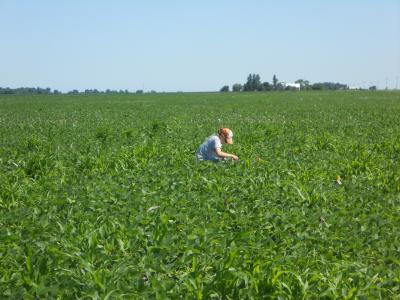A new research project has identified a specific gene in soybean that has great potential for soybean crop improvement because it can be bred to better tolerate soil salinity - that means less changes to soil and the ecosystem while still getting more food.
The researchers from the University of Adelaide in Australia and the Institute of Crop Sciences in the Chinese Academy of Agricultural Sciences in Beijing pinpointed a candidate salt tolerance gene after examining the genetic sequence of several hundred soybean varieties.

What can make a no-till soybean field even better for biodiversity? A soybean that requires no soil modification to grow. Credit: Kelly VanBeek
"Soybean is the fifth largest crop in the world in terms of both crop area planted and amount harvested," says the project's lead, University of Adelaide researcher Associate Professor Matthew Gilliham. "But many commercial crops are sensitive to soil salinity and this can cause major losses to crop yields. On top of that, the area of salt-affected agricultural land is rapidly increasing and is predicted to double in the next 35 years. The identification of genes that improve crop salt tolerance will be essential to our efforts to improve global food security."
"We initially identified the gene by comparing two commercial cultivars," noted Professor Lijuan Qiu and Dr Rongxia Guan at the Institute of Crop Sciences. "We were surprised and pleased to see that this gene also conferred salt tolerance in some other commercial cultivars, old domesticated soybean varieties and even wild soybean. It appears that this gene was lost when breeding new cultivars of soybean in areas without salinity. This has left many new cultivars susceptible to the rapid increases we are currently seeing in soil salinity around the world."
By identifying the gene, genetic markers can now be used in breeding programs to ensure that salt tolerance can be maintained in future cultivars of soybean that will be grown in areas prone to soil salinity.
"This gene functions in a completely new way from other salt tolerance genes we know about," says Associate Professor Gilliham. "We can now use this information to find similar genes in different crops such as wheat and grapevine, to selectively breed for their enhanced salt tolerance."
This research has received support from the Australian Research Council (ARC). Published in The Plant Journal.





Comments